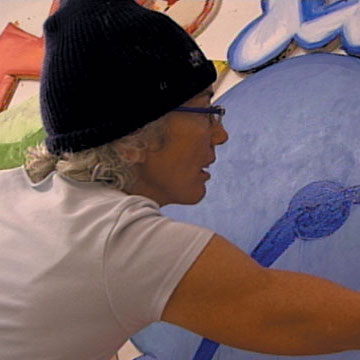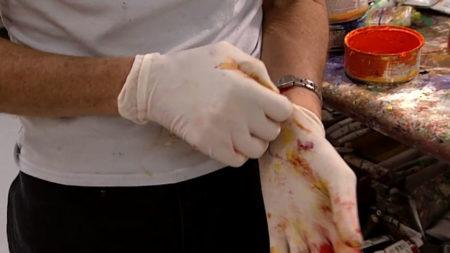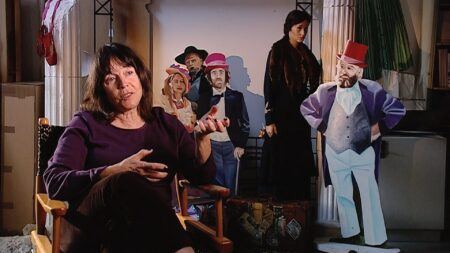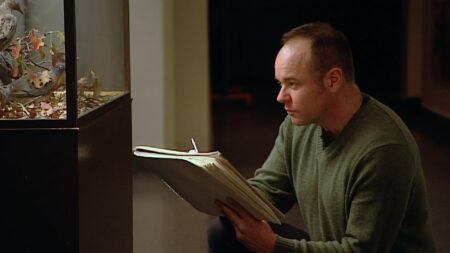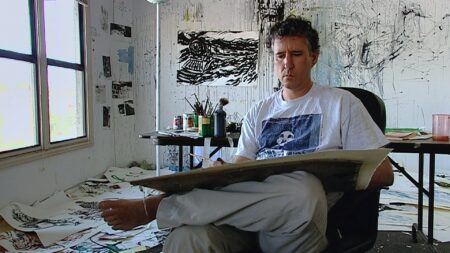Continue playing
(Time remaining: )
Play from beginning
Continue playing "{{ controller.videos[controller.getVideo(controller.currentVideo)].segmentParentTitle}}"
{{controller.videos[controller.getVideo(controller.currentVideo)].title}} has ended.
Elizabeth Murray in "Humor"
In her studio, Elizabeth Murray is painting a shaped, colorful canvas with inflated, bulbous forms. “I want there to be conflict and I want there to be tension. And yet somehow I want to make these very conflicting things live together, and not just butt up against each other.”
Murray has spent a lifetime developing her particular vision of zany and vibrant images, beginning with her time as a student at the Art Institute of Chicago where she was surrounded by great works of art such as the Abstract Expressionist paintings by DeKooning. “I just realized this was going to be my life,” says Murray.
Credits
Created by: Susan Sollins & Susan Dowling. Executive Producer & Curator: Susan Sollins. Series Producer: Eve-Laure Moros Ortega. Associate Producer: Migs Wright. Assistant Curator: Wesley Miller. Production Manager: Alice Bertoni & Laura Recht. Production Coordinator: Kelly Shindler & Sara Simonson. Director of Education & Outreach: Jessica Hamlin. Producer: Catherine Tatge. Editor: Steven Wechsler. Host Segment Artist: Charles Atlas. Host: Margaret Cho. Host Segment Guest: Bruce Daniels. Director of Photography: Bob Elfstrom, Mead Hunt, Ken Kobland, Kirk Miller, & Joel Shapiro. Sound: Tom Bergin, Doug Dunderdale, Richard Fleming, Judith Karp, Mark Mandler, Martyn Truman, & Bill Wander. Gaffer/Grip: Ned Hallick, Cricket Peters, Andrew Wilson, & Jesse Wine. Assistant Camera: Jarred Alterman, Craig Feldman, Brian Hwang, & Kipjaz Savoie. Production Assistant: Eric Kutner, Ronny Merdinger, Dawn Watson, & Pamela Whidden. Assistant Avid Editors: Julie Farol, Geoff Gruetzmacher, Daniel Nelson, & Jeremy Siefer. Still Photography: Alice Bertoni & Bob Elfstrom.
Creative Consultant: Ed Sherin. Graphic Design & Animation: Open, New York. Animation, Visual Effects & Compositing: Spontaneous Combustion. On-Line Editor: Don Wyllie & Frame:Runner NYC. Composer: Peter Foley. Voice-Over Artist: Jace Alexander. Sound Editing: Margaret Crimmins, Greg Smith, & Dog Bark Sound. Sound Mix: Tony Volante & Soundtrack F/T. Animation Stand: Frank Ferrigno & Frame:Runner NYC.
Artworks courtesy of: Eleanor Antin; Walton Ford; Elizabeth Murray; Raymond Pettibon; Electronic Arts Intermix, New York; Ronald Feldman Fine Arts; Paul Kasmin Gallery; Philadelphia Museum of Art; Regen Projects, Los Angeles; & David Zwirner Gallery.
Special Thanks: The American Museum of Natural History; The Art21 Board of Trustees; Jamie Bennett; Andrea and Eric Colombel; Cate Ellison; Bruce Gluck; Museu d’Art Contemporani de Barcelona; PaceWildenstein; Sallie Slate; Karen Taussig; Jonathan Turer; & Wingate Studio.
Interns: Sharon Ber, Elana Davidian, Eliza Geddes, Karmin Guzder, Ehren Joseph, Lisa Kalikow, Lila Kanner, Crystal Kui, Daniela Leonard, Ronny Merdinger, Parth Savla, Kristen Smith, Whitney Smith, Morgan Soloski, Jo-ey Tang, Asya Varshishky, Jesse Whittle-Utter, & Jeremy Zilar.
Public Relations: Kelly & Salerno Communications. Legal Counsel: Albert Gottesman. Bookkeeper: William Handy.
Major underwriting for Season 2 of Art in the Twenty-First Century is provided by National Endowment for the Arts, PBS, Corporation for Public Broadcasting, The Allen Foundation for the Arts, Agnes Gund and Daniel Shapiro, Bloomberg, The Jon and Mary Shirley Foundation, Nonprofit Finance Fund, JPMorgan Chase, The Andy Warhol Foundation for the Visual Arts, The Horace W. Goldsmith Foundation, New York Arts Recovery Fund, Peter Norton Family Foundation, New York Times Company Foundation, Dorothea L. Leonhart Foundation, and Elizabeth Firestone Graham Foundation.
Closed captionsAvailable in English, German, Romanian, Italian, Japanese, Korean, Chinese, Italian
Through the Art21 Translation Project, multilingual audiences from around the globe can contribute translations, making Art21 films more accessible worldwide. Translate this video now.
Interested in showing this film in an exhibition or public screening? To license this video please visit Licensing & Reproduction.
A pioneer in painting, Elizabeth Murray’s distinctively shaped canvases break with the art-historical tradition of illusionistic space in two-dimensions. Jutting out from the wall and sculptural in form, Murray’s paintings and watercolors playfully blur the line between the painting as an object and the painting as a space for depicting objects. Breathing life into domestic subject matter, Murray’s paintings often include images of cups, drawers, utensils, chairs, and tables. These familiar objects are matched with cartoonish fingers and floating eyeballs—macabre images that are as nightmarish as they are goofy. Taken as a whole, Murray’s paintings are abstract compositions rendered in bold colors and multiple layers of paint, but the details of the paintings reveal a fascination with dream states and the psychological underbelly of domestic life.
“I want there to be conflict and I want there to be tension.
And yet somehow I want to make these very conflicting things live together, and not just butt up against each other.”
Elizabeth Murray

